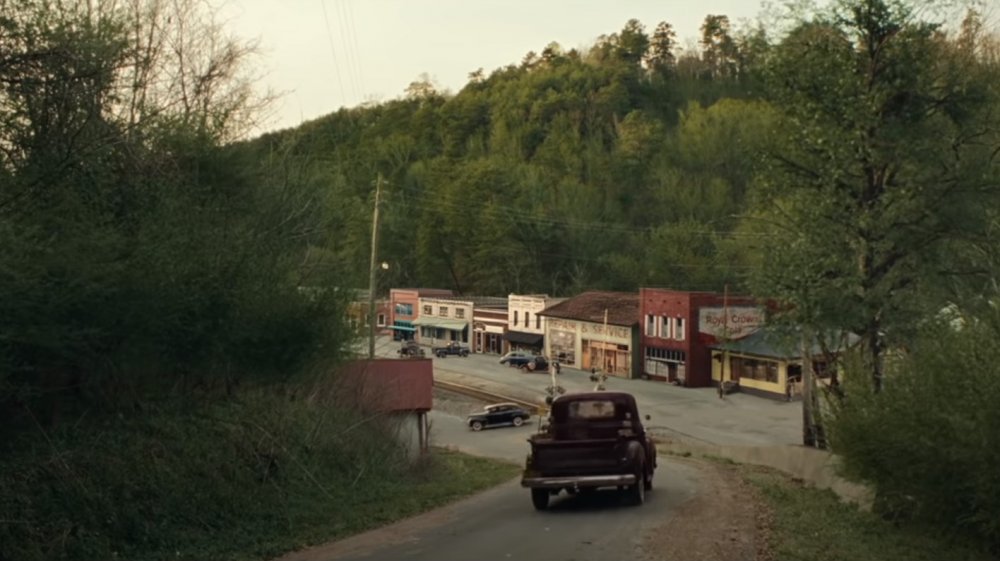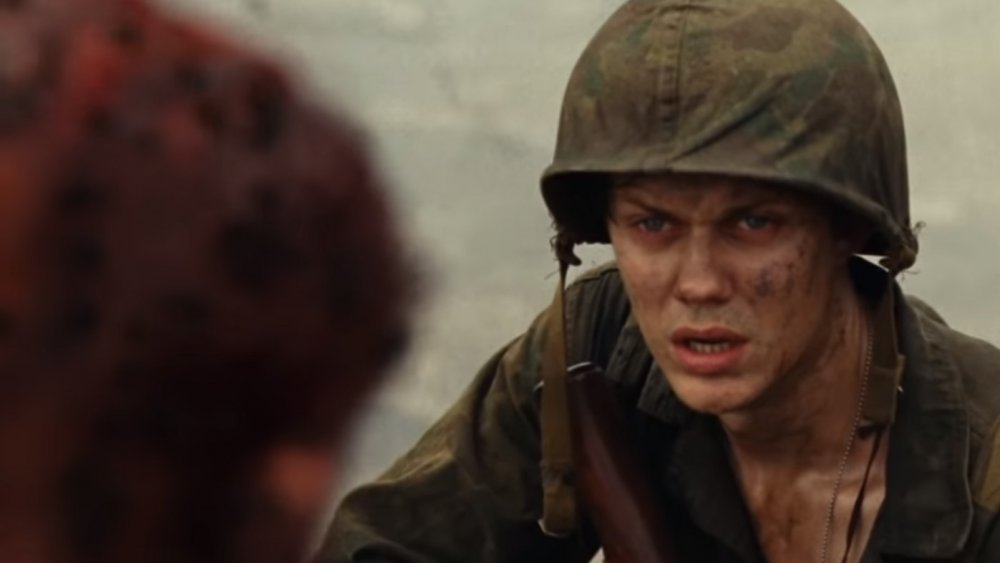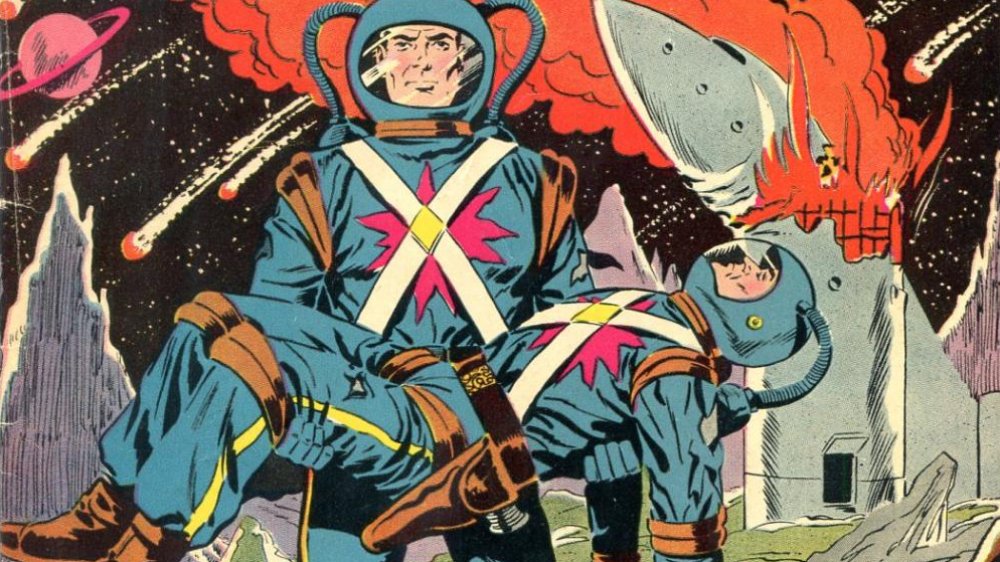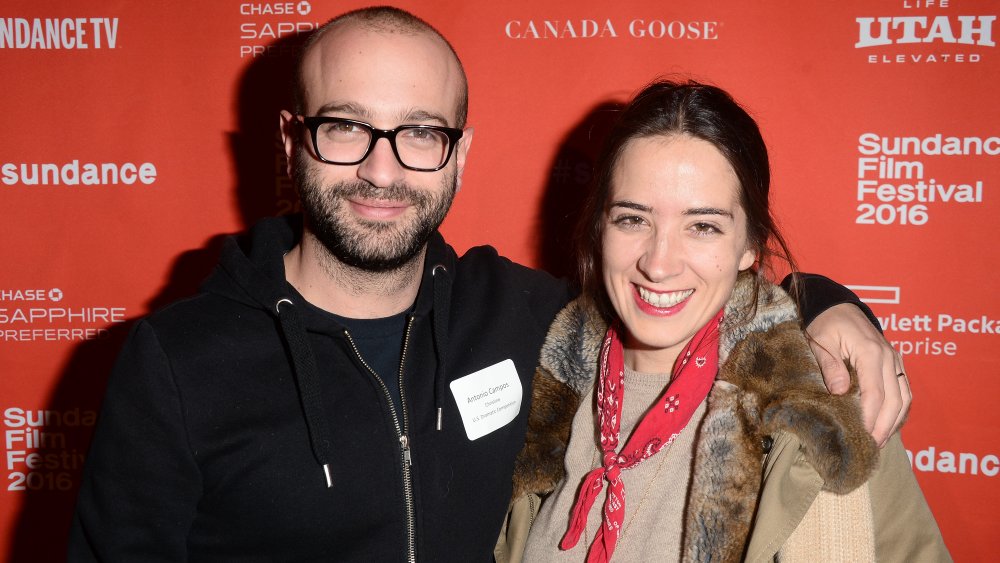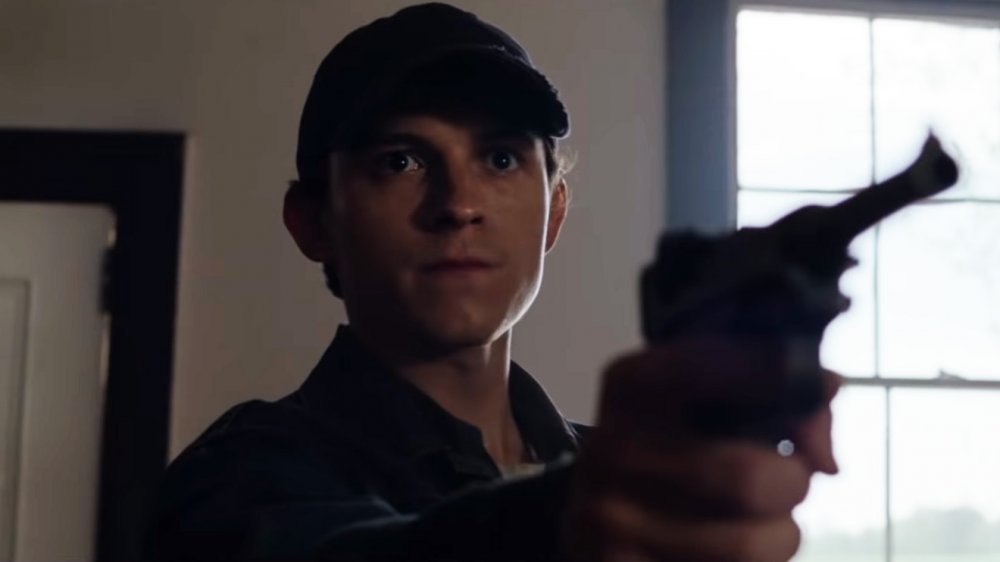Small Details You Missed In The Devil All The Time
This content was paid for by Netflix and created by Looper.
In The Devil All the Time, what you see isn't always what you get. Self-proclaimed holy men lead lives of sin. Officers of the law are more concerned with protecting themselves than the communities they've pledged to serve. Hypocrisy, corruption, and violence run rampant, and everyone is full of secrets.
That's true of the film's characters, and it's true of the movie, too. The Devil All the Time, which tells the story of a young orphan named Arvin and all the sordid characters he comes across, is stuffed full of small, evocative details and odd little Easter eggs. You may not notice them while you watch, but rest assured that each one goes a long way toward making The Devil All the Time's southern-fried gothic landscape all the more realistic, and all the more horrifying.
Some of them are subtle nods to Donald Ray Pollock's original novel. Some are sly casting choices honoring the book, director Antonio Campos, and the rest of the movie's talented crew. Many are simple period details that draw on lesser known parts of The Devil All the Time's two-decade-long timeline and are designed to give the film a legitimate authenticity. All of them are extremely well done. These aren't the kind of details you look for when watching The Devil All the Time — the story itself is gripping enough that it'll consume all of your attention — but trust us when we say you'd miss 'em if they weren't there.
Take a trip to Knockemstiff
The Devil All the Time takes place in two communities. One is Cold Creek, West Virginia, where the Russell family comes from, and where Arvin spends his teenage years. The other is Knockemstiff, a rural community in Ohio's Ross County. That's where Willard and Charlotte settled after getting married, and where crooked sheriff Lee Bodecker runs his patrols.
Believe it or not, but Knockemstiff is an actual place, although no one's quite sure where its unusual name came from. One common story contends that two women who lived there were feuding over a man. One asked a preacher for advice, and he told her the man wasn't worth it, and that someone should "knock him stiff." Other tall tales claim that "knockemstiff" was slang for moonshine, which was a popular product in those parts, or a reference to a long-forgotten brawl.
Either way, it's also where The Devil All the Time author Donald Ray Pollock grew up, and it's also the title of his award-winning short story collection. In fact, in the Devil All the Time novel, Knockemstiff isn't mentioned at all. In the book, all of the action in Ohio takes place in Meade, a small town about half an hour's drive away (in the movie, the diner where both Willard and Charlotte as well as Sandy and Carl meet is in Meade, but the rest of the proceedings have been moved further south). The change from Meade to Knockemstiff for the film is a tribute to Pollock and the book that put him on the map, and it's well-deserved. After all, without Knockemstiff, The Devil All the Time wouldn't exist.
The horrors of war
There are a few moments that define Willard Russell's life: Meeting his wife-to-be, Charlotte, in a diner. The birth of his son, Arvin. The summer Charlotte fell ill, and Willard turned to God for help that never arrived. And, finally, his time fighting in the South Pacific during World War II, when he came across a crucified American GI.
The soldier on a cross is one of The Devil All the Time's earliest images, and it sets up the rest of the movie very well. Plot-wise, this an unforgiving, violent story that takes no prisoners. Thematically, The Devil All the Time is extremely concerned with perversions of religion, and Christianity in particular. As such, crucifixion is a recurring motif throughout the movie. There's a picture of Jesus on the cross hanging on Arvin's wall. Willard hangs Arvin's dog on a cross as part of a sacrifice. Arvin, Willard, and Reverend Teagardin all injure their hands, recalling the stigmata.
In fact, that early scene is so brutally appropriate and thematically relevant that it's hard to believe that it's real, especially in a movie that's full of bizarre and extreme violence. Remarkably, it is. Japan actually has a long history with crucifixion, and while it wasn't common, Japanese soldiers really did crucify prisoners of war during World War II. Some survived. Most didn't. The Devil All the Time is a work of fiction, and while much of the movie is based in reality, its over-the-top acts of violence are largely fantasy. For better or worse, this one isn't.
Pokey LaFarge, the living throwback
In many ways, Pokey LaFarge feels like a musician from a different era. He dresses in vintage suits and plays an 80-year-old acoustic guitar. His songs borrow heavily from early 20th-century American music: jazz, country, Chicago-style blues, ragtime, folk, and old-school swing are all major parts of his compositions. After graduating high school, LaFarge hitchhiked across the country, making money by playing on street corners. Even his stage name is a throwback: the musician chose the moniker "Pokey LaFarge" largely because he liked its old-timey feel.
Ironically, all of that makes LaFarge one of the most exciting and innovative musicians on the modern scene, and it also means that he's a perfect fit for The Devil All the Time. That's why it's not too surprising that LaFarge has a small role in the film: In The Devil All the Time, LaFarge plays Theodore, right-hand man to Henry Melling's misguided preacher, Roy Lafferty.
Still, you don't cast LaFarge if you don't want him to sing, and if you think you noticed LaFarge's twangy voice on The Devil All the Time's soundtrack, you're right. Not only does LaFarge perform on camera — yeah, that's really him singing the old spiritual "Are You Washed in the Blood" with Melling, or plucking out a somber rendition of "Stealin Stealin" on the porch — but he also plays "Banks of the Ohio" over the movie's end credits. LaFarge's rendition of the song, which details the murder of a young woman at the hands of her jilted lover, complements the movie perfectly. Its light and hopeful tone masks the darkness at its core, and while the tune isn't a LaFarge original, there's no doubt that he goes ahead and makes it his own.
The voice of the Creator
Author Donald Ray Pollock didn't write The Devil All the Time's screenplay — those duties fell to director Antonio Campos and his brother, Paulo Campos — but his voice is all over the film. Oh, yes, The Devil All the Time is a remarkably faithful adaptation of Pollock's original novel. While a couple of subplots have been trimmed down and the timeline slightly adjusted, all of the big narrative beats and major characters are there. But Pollock's voice is also quite literally in the film: The author voices the narrator, who helps keep the movie's action going.
"Storytelling is an act of creation," Campos explains. "In The Devil All the Time, I wanted to use a narrator to tell the story and build a world in which we gave a voice to the 'Creator.'" And who better to play the Creator than the man who literally invented the entire thing? After all, as Campos says, Pollock knows this setting like the back of his hand, and he has a great voice. "It had to be Don," Campos tells Vanity Fair.
Campos wasn't sure if Pollock would be into the idea, but to the director's surprise, the author accepted almost immediately, and his presence adds a layer of authenticity to the proceedings that another actor would be hard-pressed to recreate. It's also one heck of an endorsement for fans of the book. If you're worried about whether or not The Devil All the Time would survive the transition to the screen, don't be. Pollock himself approves.
Charlton comics give you more!
Early in The Devil All the Time, young Arvin lounges on the couch reading comics while his mother works in the kitchen, singing the old standard "Little Bessie." However, it's not a comic published by DC. It's not Marvel, either (in fact, in the '50s, Marvel Comics as we know it didn't even exist — at that time the company was known as Atlas). If you look carefully, you can see the company that publishes Arvin's book is called Charlton. Unless you know your comic book history, that name probably doesn't ring a bell.
Charlton Comics was, however, a real company, and was launched in 1945 by an Italian immigrant named John Santangelo, Sr. and a lawyer named Ed Levy (the two met in prison, where Santangelo was serving time for copyright infringement). It adopted the name Charlton in 1946, and soon made a name for itself publishing ultra-gory (for the time) horror comics, and helped launch the careers of many comics industry heavyweights, most notably Spider-Man co-creator Steve Ditko. Given that teenage Arvin is played by Tom Holland, the latest big-screen Spidey, that's a pretty fun Easter egg.
Charlton actually had its own line of superhero comics too, which launched in 1960 and introduced the world to the likes of Captain Atom, the Question, Blue Beetle, and Peacemaker. Unfortunately, Charlton wasn't built to last. In 1983, the company sold its superhero characters to DC, and it was gone entirely by 1985. Still, its legacy lives on in two ways: Many of Charleton's caped crusaders have become integral parts of the DC Universe, while Charlton's characters were also the basis for the cast of Alan Moore and Dave Gibbons' groundbreaking miniseries Watchmen.
Family ties
Family is the heart of The Devil All the Time. While almost every character in the movie does at least one truly despicable thing, most of them are motivated by their desire to protect (or, in a couple of cases, avenge) their loved ones. Family was a big part of the movie behind the scenes, too. Director Antonio Campos co-wrote the script with his brother, Paulo. His wife, Sofía Subercaseaux, edited the film.
Those aren't the only members of the Campos family who appear in the film's end credits, either. Look carefully, and you'll find another. Now, as you know, Avengers star Tom Holland plays Arvin Russell as a teenager. Michael Banks Repeta, who also appears in the TV shows Manhunt and The Outsider, plays Arvin when he's a little younger. And who plays him as an infant? Why, none other than Emilio Subercaseaux Campos, Antonio and Subercaseaux's son.
Amazingly, this isn't young Emilio's only credit, either. In addition to The Devil All the Time, the littlest Campos also appeared in an episode of the Italian-Chilean anthology series Homemade, which tells the stories of people around the world affected by the COVID-19 pandemic. Some of the episodes are helmed by veteran directors like Paolo Sorrentino and Gurinder Chadha. Others are from stars like Kristen Stewart and Maggie Gyllenhaal, the latter of whom makes her directorial debut on the series. All of them are short, personal stories shot with whatever equipment was available and whatever talent was at hand.
As you can probably guess, Antonio Campos directed one of the episodes. "Annex," which centers on a family who find an unconscious man on a beach, stars both Subercaseaux and Emilio as well as Christopher Abbot, who Campos worked with on The Sinner, Norweigan actor and writer Mona Fastvold, and a few others. Keep an eye on this Campos kid, though. He's pretty young, but at this rate, he'll have taken over Hollywood before you know it.
What are our goals in that war-strained land?
While The Devil All the Time resides firmly in rural America, the horror of foreign wars looms large over all of its characters. Willard had his life-changing experience with the crucified soldier, which eventually led to his bizarre take on Christianity and his ultimate mental break, while fighting the Japanese in the South Pacific. Later in the movie, the threat of the Vietnam War grows larger and larger. Arvin even considers enlisting. Like he says, he is very good at fighting.
The Devil All the Time even closes with a speech by President Lyndon Johnson that was delivered on July 28, 1965. In that midday address, Johnson announced that he was scaling up the United States' presence in Vietnam, adding 50,000 more soldiers to the forces already gathered there and doubling the size of the draft. By that point, the war had already been underway for a few years, but Lyndon's speech marked a significant increase in America's involvement, one that would only grow as the '60s progressed.
Looking over Johnson's speech, it's hard not to see the parallels to Arvin's journey in The Devil All the Time. Vietnam was the first war that America really lost, of course, and it's unclear if Arvin will ever win the battle with the darkness inside him. Still, there's hope, too. In that speech, Johnson's closing words include, "As long as there are men who hate and destroy, we must have the courage to resist." Really, that's just a fancier take on Willard's main lesson to Arvin: "There's a lot of no good sons of b****** out there," and it's up to good people to keep them in check.
